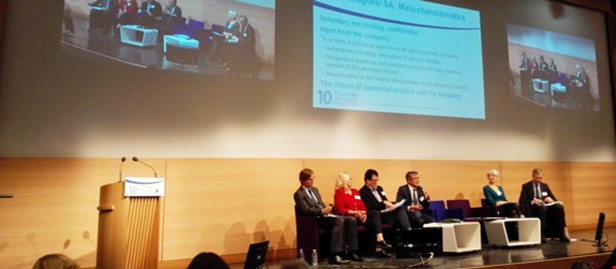Health Technology Assessment sans frontières
 © EPF
© EPF
Health technology (including both pharmaceutical products, medical devices and procedures) is dramatically evolving which leads to increasing requests for assessments on the effectiveness and appropriateness of new products available on the market.
On 30 October the Haute Autorité de Santé (HAS) in collaboration with the European Commission, organised in Paris the Health Technology Assesment (HTA) sans frontières conference. Its purpose was to outline the state of play in the HTA sector, facilitate a brainstorming among all concerned stakeholders and highlight the benefits of European cooperation in this field.
The conference, the outcomes of which can be found here, was also an opportunity to present the results of six major HTA projects, all coming to an end in 2015:
- EUnetHTA JA 2 mainly looked at the cooperation between HTA bodies in Europe. The project, which started in 2012, has been a major driver for increasing cooperation among national HTA agencies, looking at how they could build on common standards to allow reuse of assessments processes and create an environment of mutual understanding.
- The SEED (Shaping European Early Dialogues) project consisted of pilots on early dialogues that involved HTA agencies and developers of health products. The overall objective was to reduce the risk of production of data that would be inadequate to support the company’s future reimbursement requests.
- The core objective of ADVANCE HTA was to strengthen the methodological tools and practices related to the application and implementation of HTA. In particular, the project focused on streams of research to address issues such as those around value for money and the concept of value assessment.
- MedtechHTA focused on the improvement of the existing methodological framework within the paradigm of HTA for the assessment of medical devices, and on the development of a tool that provides structured, evidence-based input into health policies.
- AdhopHTA fostered the application of high-quality HTA in hospital settings and aimed to inform decision-makers of the likely value of a health technology for a specific healthcare organisation. The purpose was to facilitate the adoption of technologies with proven value in hospitals.
- INTEGRATE-HTA aimed to develop concepts and methods that enable a patient-centred, comprehensive assessment of complex health technologies.
A key take away message was the one from Jean-Luc Harrousseau (President of HAS) who called for more effective involvement of patients in the HTA process.
Contact: Valentina Strammiello, Programme Officer at valentina.strammiello@eu-patien.eu
